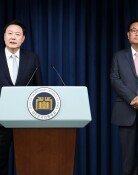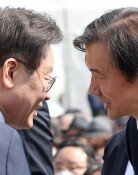No compensation for freezing nuclear program, Trump Says
No compensation for freezing nuclear program, Trump Says
Posted October. 16, 2017 07:48,
Updated October. 16, 2017 08:29
“If we can negotiate (with North Korea) and something happens, I am always open,” U.S. President Donald Trump said on Friday (local time). “But if it’s going to be something other than negotiation, we are ready – more so than we have ever been.” These remarks came shortly after he announced that he cannot certify Iran’s compliance with the 2015 nuclear agreement that put a lid on Iran’s nuclear program. Accusing Iran of violating the accord several times, Trump refused on Friday to certify Iran’s compliance with that deal and asked Congress to consider new sanctions. He also labeled North Korea and Iran “bad nation” and reiterated his commitment to sanctions.
Trump’s announcement clearly shows his view of Iran and North Korea as a group. The 2015 Iran nuclear accord, which was concluded two years ago, is a typical “reward for freeze” agreement that lifts economic sanctions in exchange for the freeze of nuclear development programs. It has also been applied to nuclear negotiations with North Korea since the 1994 Geneva Agreed Framework. Trump has criticized the agreement “the worst deal ever” that only gave bad nations time to hide their illegal behaviors. He also raised suspicions that Iran and North Korea are trading nuclear weapons, saying, “Iran is funding North Korea.”
No wonder North Korea, which is threatening the United States with a series of nuclear and missile provocations, is likely to want much more than Iran, which has not succeeded in developing nuclear weapons. The isolated regime right now has an attitude that it cannot accept any negotiations under the condition of abandoning nuclear weapons. Even if it has negotiations with the United States, the regime would want its existing nuclear missile to be recognized and to receive compensation such as suspension of the U.S.-ROK joint military drill and lifting of sanctions against it, in exchange of freezing its nuclear development in the future. However, by announcing the decertification of the Iran nuclear deal, Trump gave a sort of guideline that he would never do the same thing as the 2015 deal even if he talks with the North.
North Korea has not conducted additional provocations for more than a month since the launch of a Hwasong-12 type missile last month. For this reason, there is an observation that North Korea-U.S. talks are imminent. It is also noteworthy that Trump has said Washington “is always open to talks.” It can be seen as a forward-looking shift in attitude compared to when Trump publicly rebuked Secretary of State Rex Tillerson on possible conversation with Pyongyang, not long ago. However, Trump has reaffirmed that there is no change in the hardline response, including military options, by mentioning “more other than negotiations.”
To be sure, the North Korean nuclear issues should be ultimately resolved through dialogue. But the dialogues cannot be achieved without a fundamental change in North Korea’s attitude. As evidenced by Pyongyang’s refraining from provoking for more than a month, the military deterrence like the deployment of the U.S. strategic bomber B-1B on the Korean Peninsula is working. The Trump administration’s willingness to take out North Korea with all its means, with the strongest possible pressure is becoming firm and solid. The regime should read this U.S. policy direction exactly. As for the South Korean government, some proposed to freeze North Korean nuclear development programs, but they need to realize that there is no room for deeper discussion as such narrative only makes dissonance between South Korea and the United States.
Headline News
- Med professors announce intention to leave hospitals starting Thursday
- Bridge honoring Sgt. Moon Jae-sik unveiled in Pennsylvania
- Chief of Staff Chung tells presidential secretaries to stay away from politics
- US FTC bans noncompete agreements
- N. Korea launches cyberattacks on S. Korea's defense companies







